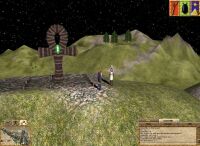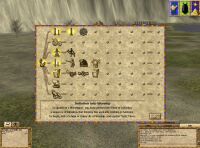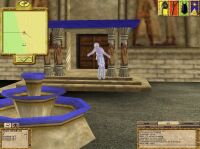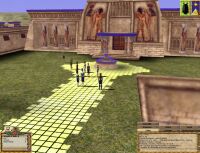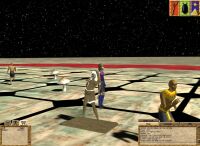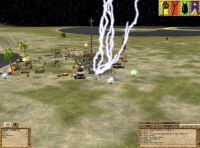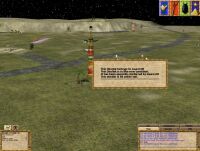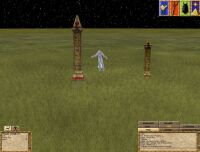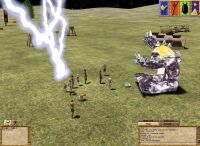|
|
|
Main News Forums Games Games Database Top 100 Release List Support Files Features Reviews Previews Interviews Editorials Diaries Misc Download Gallery Music Screenshots Videos Miscellaneous Staff Members Privacy Statement |
A Tale in the Desert Beta Report Beta 3, part 2 Val
Sucher, 2002-02-03 Introduction
There are many Schools in Egypt. There is one for each of the Disciplines as well as a University. The difference between Universities and Schools is that technology needs to be researched at Universities and that skills taught at Universities are free for all to learn. For skills to be researched at Universities, players must donate the required materials for the technology to be unlocked. You can choose to donate materials to the various Universities for more technologies to be unlocked. Thus all of Egypt gets advanced through the efforts of individual players working together.
Traveling
The Discipline of Leadership requires a citizen to take a petition around and get 20 people to sign it to be initiated into the Discipline. In theory, those 20 people who sign the petition believe that the petitioner would make a good leader and thus show their support for the petitioner by signing. Once initiated into the Discipline of Leadership, one has new goals opened to them and receives certain benefits from passing the test. For instance, you can bring a petition to be voted on by the populus of Egypt with fewer signatures on the petition. The next test is the Test of Mentorship which I discussed earlier. The initiate must have 7 shrines built in their honor to pass the test to become a Student of Leadership. One can also continue mentoring and gaining shrines which give more bonuses to the Leadership Student. For instance, with 28 shrines built in their honor, all skills at Schools are half priced. So it truly pays to mentor new players.
All of the Disciplines have direct benefits for those who advance in them. Advancing in the Disciplines of Body and Conflict will increase the players stats and abilities. For instance, you must have a sufficient rank in the Conflict Discipline to prospect for marble. Students in the Discipline of Architecture can craft Fine Steel Axes once a week which allows a player to gather 3x the normal amount of wood from trees. Students of Worship are able to operate Flax Gins which makes the production of vital materials like canvas and rope a great deal easier. Those who pass the test of Demi-Pharaoh in the Discipline of Leadership have the power to permanently ban one person from the game. These tests get increasingly difficult to pass. Let's face it, people aren't going to trust just anyone with the power to ban another person. The game is centered around these tests and you'll need the cooperation of other players to complete some of them. Each Discipline has seven levels. When you have reached level seven in a Discipline, then you have mastered it and can complete a "Great Work". These so-called "Great Works" have not been revealed in beta. They will have to be discovered when players advance far enough after the release of the game.
Overall, the tests drive the players forward. Everyone is striving to complete their tests to advance and thus new technologies are researched and all of Egypt is driven forward. It's a unique model for a game. It will be interesting to see how ATITD does when it goes live.
Average Reader Ratings: 7.69 (35 votes) |
||||||||||||
|
All original content of this site is copyrighted by RPGWatch. Copying or reproducing of any part of this site is strictly prohibited. Taking anything from this site without authorisation will be considered stealing and we'll be forced to visit you and jump on your legs until you give it back. |
||





